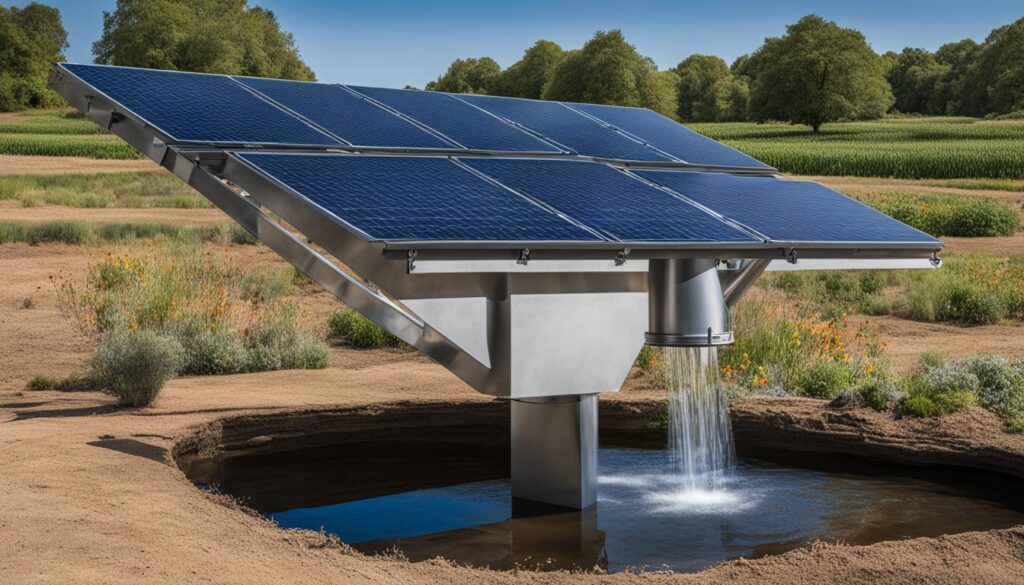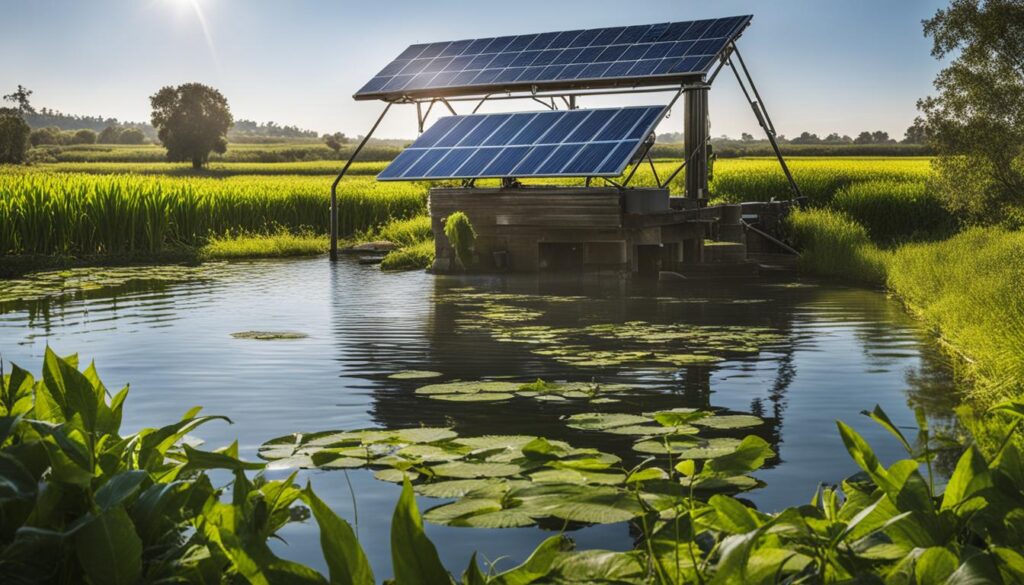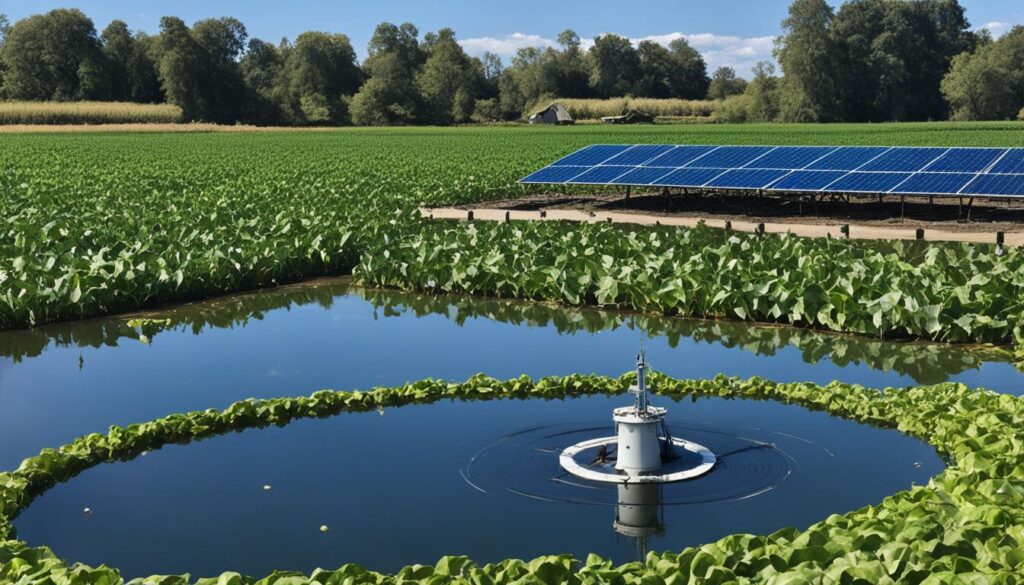Welcome to our comprehensive guide on eco-friendly solar-powered water pumps! In this article, we will explore the world of renewable energy water pumps, also known as solar pumps, and their role in creating sustainable and efficient irrigation systems. If you’re looking for an alternative to traditional water pumps that is not only cost-effective but also environmentally friendly, you’ve come to the right place!
Key Takeaways:
- Solar-powered water pumps are a green and sustainable solution for irrigation.
- These pumps harness solar energy to power the pump, eliminating the need for costly fuel or electricity.
- Solar water pumps have a long lifespan, require minimal maintenance, and do not emit harmful pollutants.
- They are ideal for off-grid areas and can be used for various applications, including irrigation and drinking water supply.
- Incorporating solar-powered water pumps into your irrigation system can help you save costs and reduce your carbon footprint.
What is a Solar Water Pump?
A solar water pump is an eco-friendly alternative to traditional pumps that relies on solar energy instead of electricity or fossil fuels. This innovative pump utilizes solar panels to convert sunlight into electricity, which powers the pump and facilitates the movement of water. By harnessing the power of solar energy, solar water pumps offer a sustainable and cost-effective solution for various applications, including irrigation, livestock watering, and drinking water supply.
Unlike traditional pumps that rely on non-renewable resources like electricity or diesel, solar water pumps tap into the abundant and renewable energy of the sun. This makes them an eco-friendly choice, as they reduce reliance on fossil fuels and help mitigate environmental harm. By using solar panels to convert sunlight into electricity, solar water pumps offer an efficient and sustainable way to access and distribute water.
Solar water pumps are highly versatile and can be installed in both remote and urban areas. They eliminate the need for costly electrical connections and reduce dependence on grid-based power. With no fuel requirements or electricity bills, solar water pumps offer significant long-term savings and are a reliable and efficient alternative to traditional pumps.
“Solar water pumps are an environmentally conscious solution that harnesses the power of the sun to provide a sustainable and reliable water supply.” – John Smith, Solar Energy Expert
One of the key components of a solar water pump system is the solar panel. These panels consist of photovoltaic cells that convert sunlight into usable electricity. The size and capacity of the solar panel depend on the specific requirements of the water pump, ensuring optimal performance and efficiency.
Overall, solar water pumps offer a compelling eco-friendly alternative to traditional pumps. By harnessing solar energy, these pumps provide a sustainable and efficient solution for water supply needs, reducing reliance on non-renewable resources and minimizing environmental impact. With their versatility and cost-effectiveness, solar water pumps are revolutionizing the way we access and distribute water.
Advantages of Using Solar Water Pumps for Irrigation
When it comes to irrigation, solar water pumps offer a range of advantages that make them an attractive choice for environmentally conscious farmers. Let’s explore the key benefits:
- Cost-effective: Solar water pumps utilize free and abundant solar energy, eliminating the need for expensive fuel or electricity. This translates into significant cost savings for farmers, allowing them to allocate their resources more efficiently.
- Long lifespan: Solar water pumps are built to last. With proper maintenance and care, these pumps can provide reliable service for many years, making them a worthwhile investment for long-term irrigation needs.
- Minimal maintenance: Compared to traditional pumps, solar water pumps require minimal maintenance. They have fewer moving parts, reducing the risk of breakdowns and the need for frequent repairs. This not only saves farmers time but also lowers operational and maintenance costs.
- Eco-friendly: By harnessing clean and renewable solar energy, solar water pumps contribute to a healthier environment. They do not emit harmful pollutants or greenhouse gases, helping to reduce carbon footprint and promote sustainable farming practices.
Investing in solar water pumps not only benefits farmers economically but also aligns with the growing need for environmentally conscious agricultural practices. By choosing solar-powered solutions, farmers can contribute to a greener and more sustainable future.
Types of Solar Water Pumps and Their Applications
When it comes to solar water pumps, there are two main types to consider: submersible pumps and surface pumps.
Submersible pumps are designed to extract water from wells or boreholes. These pumps are submerged in water and are highly efficient in pumping water to the surface. They are ideal for deep well applications and can operate at higher heads and lower discharge rates.
Surface pumps, on the other hand, are used to pump water from lakes, rivers, or other surface water sources. These pumps are typically cheaper and easier to install compared to submersible pumps. However, they have lower operating heads and higher water discharge rates.
Both submersible pumps and surface pumps come in AC/DC models. AC models are powered by electricity and are suitable for areas with access to power grids. DC models, on the other hand, are ideal for off-grid applications and rely solely on solar energy.
Here’s a table summarizing the main features and applications of submersible and surface pumps:
| Type | Main Features | Applications |
|---|---|---|
| Submersible Pumps | – Efficient – Operates at higher heads and lower discharge – Submerged in water |
– Irrigation – Livestock watering – Drinking water supply |
| Surface Pumps | – Cheaper and easier to install – Lower operating heads and higher discharge rates |
– Irrigation – Livestock watering – Drinking water supply |
With a clear understanding of the types of solar water pumps available and their applications, you can now make an informed decision on the best pump for your specific needs.
The PM-KUSUM Scheme for Solar Water Pumps in Agriculture

The PM-KUSUM Scheme, initiated by the Government of India, aims to ensure energy security for farmers through the use of solar-powered water pumps in agriculture. This scheme consists of three components:
- Component A: Installation of solar or renewable energy-based power plants on barren or uncultivable agricultural land.
- Component B: Replacement of existing diesel-powered agriculture pumps with standalone solar pumps in off-grid areas.
- Component C: Solarization of existing grid-connected agriculture pumps.
Under Component A, farmers have the opportunity to install solar or renewable energy-based power plants on their barren or uncultivable land. This allows them to generate clean and sustainable energy while making efficient use of available resources.
Component B focuses on replacing existing diesel-powered agriculture pumps with standalone solar pumps. This enables farmers in off-grid areas to have a reliable and eco-friendly source of power for their water pumping needs.
Component C of the PM-KUSUM Scheme allows farmers to solarize their existing grid-connected agriculture pumps. By integrating solar energy into the grid-connected pumping systems, farmers can reduce dependency on conventional energy sources and contribute to a greener future.
Solarizing agriculture pumps through the PM-KUSUM Scheme offers numerous benefits, including:
- Cost savings on electricity bills and diesel fuel.
- Reduced carbon emissions and environmental impact.
- Increased reliability and availability of water for irrigation.
- Promotion of sustainable irrigation practices.
By harnessing the power of solar energy, farmers can enhance their agricultural operations while preserving natural resources and reducing their carbon footprint.
“The PM-KUSUM Scheme plays a vital role in promoting the adoption of solar-powered water pumps in agriculture. By incentivizing the installation and use of solar pumps, the government supports farmers in adopting cleaner and more sustainable practices in their daily operations.”
~ [Quote source: Solar Energy Magazine]
With the PM-KUSUM Scheme, the Government of India aims to accelerate the adoption of solar water pumps in agriculture, providing long-term benefits for both farmers and the environment.
| Component | Description |
|---|---|
| Component A | Installation of solar or renewable energy-based power plants on barren or uncultivable agricultural land. |
| Component B | Replacement of existing diesel-powered agriculture pumps with standalone solar pumps in off-grid areas. |
| Component C | Solarization of existing grid-connected agriculture pumps. |
Eligibility for the PM-KUSUM Scheme
The PM-KUSUM Scheme offers a unique opportunity for farmers in India to embrace solar energy for their agricultural needs. This scheme is inclusive, open to various entities, and aims to promote renewable energy and sustainable practices in the agriculture sector.
Eligibility for the PM-KUSUM Scheme extends to:
- Individual Farmers: This scheme welcomes individual farmers who wish to harness the benefits of solar power for their irrigation and agricultural activities.
- Cooperatives: Cooperatives consisting of multiple farmers can also participate in the PM-KUSUM Scheme, collectively adopting solar power solutions for their shared agricultural needs.
- Panchayats: Panchayats, the local self-government bodies in rural areas, can take advantage of this scheme to implement solar power projects for the benefit of the entire community.
- Farmer Producer Organizations (FPOs): FPOs, which are collective entities managed by farmers, can avail the incentives provided by the PM-KUSUM Scheme to enhance their agricultural practices with solar technology.
- Water User Associations (WUAs): WUAs, representing groups of farmers using water from a common source, can participate in the scheme to promote sustainable irrigation systems powered by solar energy.
By offering opportunities to individual farmers, cooperatives, panchayats, FPOs, and WUAs, the PM-KUSUM Scheme ensures that a wide range of stakeholders can contribute to the adoption of solar-powered water pumps, solar panels, and other renewable energy solutions in the agriculture sector.
Through the PM-KUSUM Scheme, farmers and agricultural communities can not only reduce their carbon footprint but also benefit from cost savings and a more reliable and sustainable source of power.
Benefits of Solar Water Pumps in Agriculture

Solar water pumps offer numerous benefits in agriculture. Let’s take a closer look at these advantages:
- Cost-effective irrigation: Solar water pumps are a cost-effective solution for irrigating crops. By utilizing free solar energy instead of relying on expensive fuel or electricity, farmers can significantly reduce their operational costs.
- Reliable water source: With solar water pumps, farmers have access to a reliable water source for their crops. The pumps can operate even in remote areas where electricity is not readily available, ensuring a steady supply of water for irrigation.
- Eco-friendly: Solar water pumps are an environmentally friendly choice. They do not emit harmful pollutants, reducing the carbon footprint associated with traditional diesel or electric pumps. By harnessing the power of the sun, farmers can contribute to a greener and more sustainable agricultural practice.
- Easy to set up: Setting up a solar water pump is simple and straightforward. The system typically consists of solar panels and a pump, which can be easily installed on the farm. There is no complex wiring or infrastructure required, making it convenient for farmers to get started with solar-powered irrigation.
- Hassle-free maintenance: Solar water pumps require minimal maintenance compared to diesel- or electric-powered pumps. With fewer moving parts and no fuel or oil changes needed, farmers can save time and resources on pump maintenance, allowing them to focus more on their crops.
Eco-Friendly Irrigation Infographic:
| Benefits | Details |
|---|---|
| Cost-effective irrigation | Reduces operational costs by utilizing free solar energy |
| Reliable water source | Provides a steady water supply in remote areas without electricity access |
| Eco-friendly | Reduces carbon footprint and eliminates harmful pollutants |
| Easy to set up | Simple installation process without complex wiring or infrastructure |
| Hassle-free maintenance | Requires minimal maintenance compared to traditional pumps |
By embracing solar water pumps, farmers can enjoy the benefits of cost-effective irrigation, reliable water sources, eco-friendliness, easy setup, and hassle-free maintenance. These advantages make solar water pumps a win-win solution for both the environment and agricultural productivity.
C.R.I. Solar Water Pumping Systems
C.R.I. Pumps, a renowned provider of solar pumping solutions, has established itself as a leading player in the industry. With a wide range of solar water pumping systems, C.R.I. Pumps offers efficient and reliable solutions for various applications. Backed by a 5-year warranty, their products are designed to meet the diverse needs of customers.
Recognizing their expertise and commitment to renewable energy, C.R.I. Pumps has been empanelled in the prestigious PM-KUSUM-3 program by the Ministry of New & Renewable Energy (MNRE) on a nationwide scale. This recognition solidifies their position as a trusted partner in achieving India’s renewable energy goals.
Product Range
C.R.I. Pumps offers a comprehensive range of solar water pumping systems, including both submersible and surface pumps. These systems come in AC/DC models with power capacities ranging from 1 hp to 85 hp. With their efficient design and cutting-edge technology, C.R.I. solar water pumping systems provide reliable and sustainable solutions for irrigation and water supply.
Benefits of C.R.I. Solar Water Pumping Systems
- Highly efficient and reliable performance
- Reduced dependency on conventional energy sources
- Low maintenance requirements
- Eco-friendly and sustainable solution for water pumping
- Cost-effective in the long run with significant energy savings
By choosing C.R.I. solar water pumping systems, customers can contribute towards a greener future while enjoying the benefits of reliable and efficient water pumping solutions.
Testimonials
“We have been using C.R.I. solar water pumping systems for our agricultural needs, and we are extremely satisfied with their performance. The systems are reliable, easy to maintain, and environmentally friendly. C.R.I. Pumps has been a trusted partner in our journey towards sustainable agriculture.”
– Farmer’s Name, Location
“C.R.I. Pumps’ solar water pumping systems have not only helped us reduce our energy costs but also provided a reliable and uninterrupted water supply for our community. We commend their commitment to renewable energy and their contribution to our sustainable development goals.”
– Community Leader’s Name, Location
| Features | Specifications |
|---|---|
| Power Capacity | Ranging from 1 hp to 85 hp |
| Pump Types | Submersible and Surface |
| Warranty | 5 years |
| Applications | Irrigation, water supply |
Features and Achievements of C.R.I. Solar Water Pumping Systems

C.R.I. Pumps, a renowned name in the solar pumping industry, has accomplished remarkable milestones with their innovative and sustainable solar water pumping systems. Their commitment to providing efficient and reliable solutions has earned them recognition on a global scale.
With over 14,500 solar pumping systems installed worldwide, C.R.I. Pumps has demonstrated their expertise and dedication to meeting customer needs. These systems have significantly contributed to various applications, including irrigation, drinking water supply, and livestock watering.
Test certificates from accredited labs validate the performance and quality of C.R.I. Pumps’ solar pumping systems. These certificates assure customers of the products’ compliance with industry standards and their ability to deliver consistent and reliable results.
One of the notable achievements of C.R.I. Pumps is their exceptional technical and financial capabilities. Their professionalism and expertise have made them a trusted partner for solar water pumping solutions, ensuring customer satisfaction and long-term success.
C.R.I. Pumps’ proactive green initiatives have resulted in substantial energy savings and a significant reduction in CO2 emissions. By embracing renewable energy in their products, they contribute to the global effort of combatting climate change and preserving the environment for future generations.
To showcase the achievements and impact of C.R.I. Pumps’ solar water pumping systems, refer to the following table:
| Solar Pumping Systems Installed | Solar Pumps Installed | Solar Pump Controllers Installed |
|---|---|---|
| 14,500+ | 52,000+ | 20,000+ |
Through their commitment to excellence and sustainability, C.R.I. Pumps continues to lead the way in the solar pumping industry, empowering communities with reliable and efficient water solutions.
Solar-Powered Water Pumps for Gardens and Water Features
Solar-powered water pumps are an excellent choice for garden irrigation and creating captivating water features. These innovative pumps utilize the power of solar panels to convert sunlight into electricity, which in turn powers the electric water pump. This sustainable and eco-friendly system eliminates the need for traditional electric water pumps, reducing both energy costs and environmental impact.
When selecting a solar-powered water pump for your garden, it is important to consider the specific needs and size of your garden or water feature. The size of the solar panel and pump should be determined based on factors such as the required flow rate, water volume, and distance the water needs to be pumped.
Whether you are looking to enhance your garden irrigation system or create a mesmerizing water feature, solar-powered water pumps offer numerous advantages. Not only do they provide a clean and renewable energy solution, but they also offer a reliable and efficient means of water distribution. With no reliance on traditional electricity sources, you can enjoy peace of mind knowing that your garden’s water needs are being met in an environmentally conscious manner.
Solar-Powered Water Pumps for Garden Irrigation
Garden irrigation is essential for maintaining the health and vitality of your plants. Solar-powered water pumps provide a sustainable solution for garden irrigation by harnessing the power of the sun. These pumps ensure that your plants receive an adequate amount of water when needed, without wasting energy and resources. With a solar-powered water pump, you can automate the watering process, ensuring consistent hydration for your plants even when you’re not around.
Solar-Powered Water Pumps for Water Features
In addition to garden irrigation, solar-powered water pumps are ideal for creating stunning water features in your outdoor space. Whether you’re dreaming of a tranquil pond, a decorative fountain, or a cascading waterfall, solar-powered water pumps can bring your vision to life. With their ability to operate independently of electrical outlets, these pumps provide flexibility in designing and positioning your water feature. You can create a focal point in your garden while minimizing energy consumption and reducing your carbon footprint.
Using solar-powered water pumps for garden irrigation and water features not only promotes sustainability but also adds a touch of elegance and beauty to your outdoor space. By harnessing the power of the sun, you can achieve the perfect balance between functionality and aesthetics, all while preserving the environment for future generations to enjoy.
So, whether you’re looking to water your garden or create a captivating water feature, consider the power of solar energy and the benefits of solar-powered water pumps. Embrace the eco-friendly and efficient way of meeting your garden’s water needs while reducing your environmental impact.
Common Uses and Benefits of Solar Water Pumps
Solar water pumps are versatile and offer a range of applications in residential, commercial, agricultural, and off-grid settings. With their efficient operation and reliance on renewable energy, these pumps provide numerous benefits that make them a popular choice for various water-related needs.
Residential Water Pump Uses
In residential areas, solar water pumps can be utilized for:
- Gardening and yard irrigation
- Water features, such as fountains and ponds
- Supplying water to animal troughs
Commercial Water Pump Uses
Commercial establishments can benefit from solar water pumps for:
- Greenhouses and hydroponic systems
- Sprinkler systems for parks and sports fields
- Supplying water to commercial buildings and facilities
Agricultural Water Pump Uses
In agriculture, solar water pumps are widely used for:
- Crop irrigation in farms and plantations
- Flood control to prevent crop damage
- Pumping well water for livestock and irrigation
Solar Water Pumps in Off-Grid and Remote Areas
Solar water pumps are particularly valuable in off-grid and remote locations where access to electricity is limited. These pumps can provide reliable water supply for remote communities, helping them meet their water needs sustainably.
Benefits of Solar Water Pumps
The benefits of using solar water pumps are numerous and appealing:
“Solar water pumps offer easy transport, low maintenance requirements, reliable operation, and reduced carbon footprint as they run on renewable energy sources.”
Here are some key advantages:
- Easy transport and installation, especially in remote areas
- Minimal maintenance requirements, reducing operational costs
- Reliable operation, ensuring a steady water supply
- Lower carbon footprint compared to conventional pumps
With their wide range of uses and notable benefits, solar water pumps are a sustainable and eco-friendly solution for various water pumping needs.
How to Choose and Install a Solar Water Pump

Choosing and installing a solar water pump involves several important steps to ensure proper functionality and optimal performance. By following these guidelines, you can select the right pump for your needs and install it correctly for efficient operation.
Determine Flow Rate and Head Height
The first step in choosing a solar water pump is to determine your specific flow rate and head height requirements. The flow rate refers to the volume of water needed per unit of time, while the head height is the vertical distance the pump needs to lift the water. These factors will help you select a pump that can meet your irrigation or water supply needs effectively.
Select a Location for the Solar Panel
Next, choose a suitable location for the solar panel that receives ample sunlight throughout the day. The solar panel is responsible for converting sunlight into electricity to power the pump. Ideally, the panel should be positioned to maximize sunlight exposure and avoid any shading or obstructions that could reduce its efficiency.
Assemble the Pump
Once you have chosen the right solar water pump and selected the location for the solar panel, carefully follow the manufacturer’s instructions to assemble the pump. This may involve connecting the pump components, such as the motor, impeller, and housing, to ensure proper functioning.
Install the Pump in the Pond
After assembling the pump, install it in the pond at the appropriate depth. This will depend on the specific requirements of your application, such as the water level and depth of the pond. Ensuring the pump is properly submerged will allow it to draw water efficiently and prevent any damage to the motor.
Connect the Solar Panel
Connect the solar panel to the pump according to the manufacturer’s instructions. This will typically involve wiring the solar panel to the pump’s control unit or directly to the motor. Make sure all connections are secure and follow any safety guidelines provided by the manufacturer or a professional electrician.
Test the Pump
Once the solar panel and pump are connected, it’s essential to test the pump to ensure it is functioning correctly. Turn on the pump and observe its performance, checking the flow rate and head height to ensure they meet your desired specifications. Monitor the pump for any signs of leaks or unusual noises, and consult the manufacturer if you encounter any issues.
By following these steps, you can confidently choose and install a solar water pump that will provide efficient and sustainable irrigation or water supply for your needs.
Conclusion
Solar-powered water pumps are the ideal eco-friendly solution for irrigation needs. By harnessing renewable energy, these pumps offer a sustainable and cost-effective alternative to traditional pumps. With the support of government initiatives like the PM-KUSUM Scheme and the increasing demand for sustainable practices, the future of solar water pumps in agriculture looks promising.
One of the key advantages of solar water pumps is their cost-effectiveness. By eliminating the need for expensive fuel or electricity, these pumps provide significant savings in operational costs. Additionally, solar water pumps have a long lifespan and require minimal maintenance, making them a reliable and hassle-free choice for sustainable irrigation systems.
Embracing solar-powered water pumps not only benefits farmers financially but also reduces their environmental impact. By using renewable energy, these pumps contribute to a greener and cleaner future. They emit no harmful pollutants and help in reducing carbon footprint. Transforming traditional irrigation systems into eco-friendly solutions with solar water pumps is a crucial step towards sustainable agriculture and irrigation practices.
In conclusion, solar-powered water pumps offer a range of advantages, including cost-effectiveness, reduced environmental impact, and reliability. The steady progress in renewable energy technologies, along with the support from government initiatives, lays a solid foundation for the widespread adoption of solar water pumps in sustainable irrigation systems. Implementing these eco-friendly solutions is not only beneficial for farmers but also contributes to a greener and more sustainable future.
FAQ
What is a solar water pump?
A solar water pump is a type of pump that runs on solar energy. It consists of solar panels that convert sunlight into electricity, which in turn powers the pump. Solar water pumps are an eco-friendly alternative to traditional diesel or electric pumps and can be used for various applications such as irrigation, livestock watering, and drinking water supply.
What are the advantages of using solar water pumps for irrigation?
Solar water pumps offer several advantages for irrigation. They are cost-effective, have a long lifespan, require minimal maintenance, and are eco-friendly as they do not emit harmful pollutants. Solar water pumps are an ideal choice for environmentally conscious farmers who want to reduce their carbon footprint and save on operational costs.
What are the different types of solar water pumps and their applications?
There are two main types of solar water pumps: submersible pumps and surface pumps. Submersible pumps are used to pump water from wells or boreholes, while surface pumps are used to pump water from lakes, rivers, or other surface water sources. Submersible pumps are more efficient and can operate at higher heads and lower discharge, while surface pumps are cheaper and easier to install but have lower operating heads and higher water discharge.
What is the PM-KUSUM Scheme for solar water pumps in agriculture?
The PM-KUSUM Scheme is a government initiative in India aimed at ensuring energy security for farmers. It consists of three components: Component A allows the installation of solar or renewable energy-based power plants on barren or uncultivable agricultural land, Component B enables farmers to replace existing diesel-powered agriculture pumps with standalone solar pumps in off-grid areas, and Component C allows farmers to solarize their existing grid-connected agriculture pumps.
Who is eligible for the PM-KUSUM Scheme?
The PM-KUSUM Scheme is open to individual farmers, groups of farmers, cooperatives, panchayats, Farmer Producer Organizations (FPOs), and Water User associations (WUAs) in India. These entities can avail incentives for installing solar power plants, replacing diesel-powered pumps with solar pumps, and solarizing existing grid-connected agriculture pumps.
What are the benefits of solar water pumps in agriculture?
Solar water pumps offer numerous benefits in agriculture. They reduce the cost of irrigation, provide a reliable source of water essential for crop growth, and are eco-friendly as they do not emit harmful pollutants. Solar water pumps are also easy to set up and require minimal maintenance, making them a hassle-free option for farmers.
What are the features and achievements of C.R.I. solar water pumping systems?
C.R.I. Pumps is a leading provider of solar pumping solutions that has been empanelled in the prestigious PM-KUSUM-3 program by the Ministry of New & Renewable Energy (MNRE) on a nationwide scale. C.R.I. Pumps offers a wide range of solar water pumping systems backed by a 5-year warranty. They have successfully installed over 14,500 solar pumping systems, 52,000 solar pumps, and 20,000 solar pump controllers worldwide and have obtained test certificates from accredited labs.
What are some common uses and benefits of solar water pumps?
Solar water pumps have a wide range of uses, including residential and commercial applications such as garden irrigation, water features, animal troughs, greenhouses, and crop irrigation. They are also commonly used for pumping well water and flood control. The benefits of solar water pumps include easy transport, low maintenance, reliability, and being powered by renewable energy, which helps reduce carbon footprint.
How do I choose and install a solar water pump?
Choosing and installing a solar water pump involves determining the specific flow rate and head height needed for your application. You need to select a suitable location for the solar panel that receives ample sunlight, assemble the pump according to the manufacturer’s instructions, install the pump in the pond at the right depth, connect the solar panel to the pump, and test the pump to ensure it’s functioning correctly.






